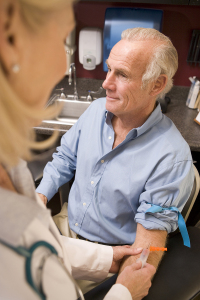The diagnosis of testicular cancer concentrates at establishing a histological diagnosis and at the same time determining accurately the stage of the cancer.
An urgent referral to a urologist is done and this specialist likely will very quickly arrange for a radical orchiectomy of the primary tumor first. This will stop any spread of the testicular cancer and at the same time give information about the histology of the cancer, and how widespread it is. Questions like whether or not the cancer is local or already metastasized need to be answered.
If the specimen that was sent to the pathologist shows that the cancer has spread beyond the testicular border, then a modified retroperitoneal lymph node dissection might have to be done. Once this is done, further staging information will be obtained from the operative specimens. However, CT scanning of the pelvic and paraaortic lymph glands might give this information needed for staging as well. The patient in consultation with the specialist might opt for radiotherapy instead.
There are some important tumor markers that can be detected in the blood stream. Alpha-fetoprotein might be positive and can be used to monitor for remissions (=tumor goes away) or relapses (=tumor comes back).
Similarly the beta-subunit of HCG (beta HCG) can also be positive similar to the choriocarcinoma in females. When there is a lot of tumor load the LDG blood test might be positive. In the case of extragonadal germ cell tumors as indicated above, CT scans and ultrasound examinations and possibly MRI scans of other structures such as the pineal gland, stomach, sternum, retroperitoneal space, prostate gland and thyroid gland may be required. All of these locations can, as pointed out above harbor germ cells that can degenerate into cancer.
References:
1. Cancer: Principles &Practice of Oncology.4th edition. Edited by Vincent T. DeVita, Jr. et al. Lippincott, Philadelphia,PA, 1993. Chapter on Cancer of the Testis.
2. Cancer: Principles&Practice of Oncology. 5th edition, volume 1. Edited by Vincent T. DeVita, Jr. et al. Lippincott-Raven Publ., Philadelphia,PA, 1997. Chapter on Cancer of the Testis.
3. Votrin II et al. Drugs Exp Clin Res 2000;26(5-6):267-273.
4. B Aschhoff Drugs Exp Clin Res 2000;26(5-6):249-252.
5. Conn’s Current Therapy 2004, 56th ed., Copyright © 2004 Elsevier
6. Ferri: Ferri’s Clinical Advisor: Instant Diagnosis and Treatment, 2004 ed., Copyright © 2004 Mosby, Inc







